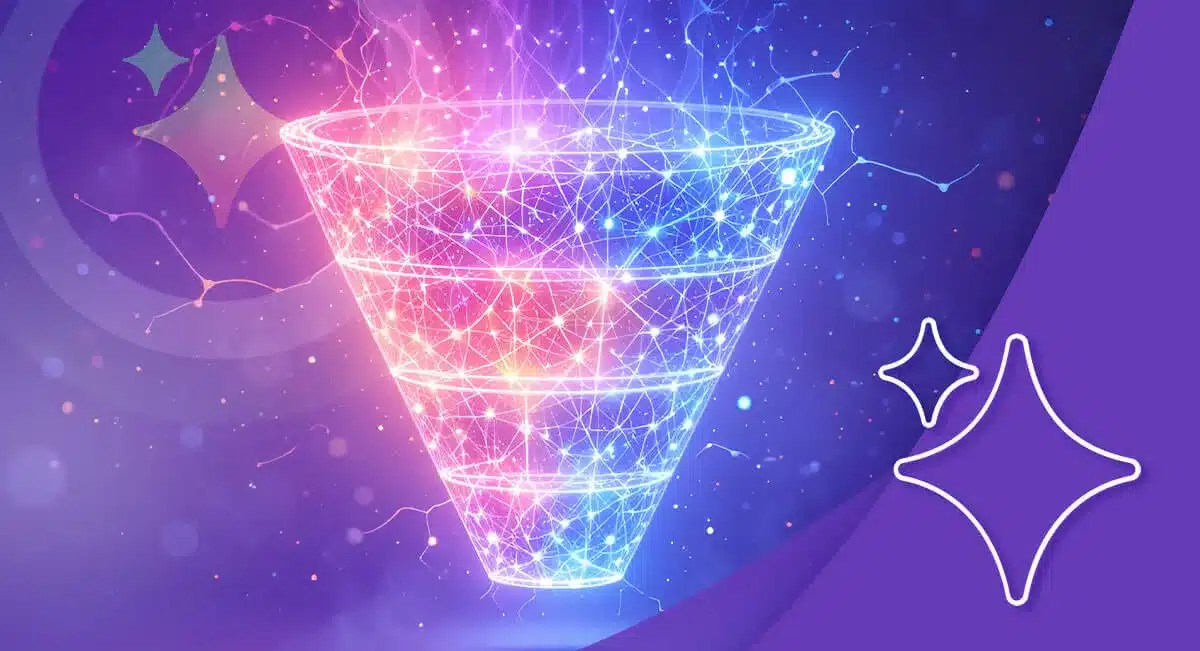AI-powered funnels are automated systems designed to enhance or complement existing sales funnels. They leverage predictive analytics and other innovations to improve lead generation and conversion rates.
More than 75% of organizations use automation and AI in marketing, and those that do are more likely to say their strategies are successful. In this article, we’ll go through the various benefits and use cases of automating your sales funnels with the power of AI, and how it can help your agency save time and resources.
Acquire and serve 10x more clients with AI-powered software
What is an AI-Powered Funnel?
An AI-powered funnel is a dynamic, data-driven version of the traditional marketing and sales funnel, enhanced with artificial intelligence technologies such as machine learning, automation, and real-time personalization. Unlike static funnels that rely on rigid, predefined customer journeys, AI-powered funnels continuously adapt to user behavior, optimizing engagement and conversion at every stage.
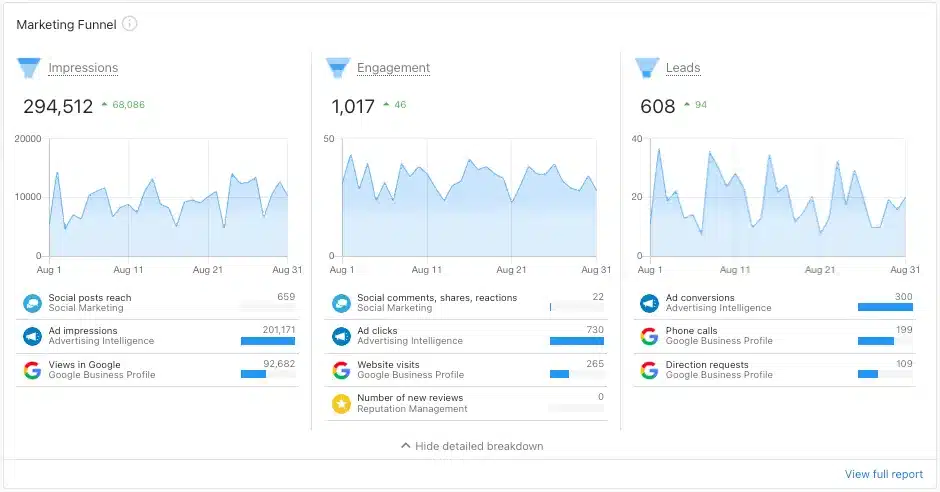
The Core Components of an AI-Powered Funnel
1. Automation
AI funnels automate repetitive marketing and sales tasks—like lead scoring, follow-ups, segmentation, and content distribution—freeing up human teams to focus on strategy and relationship-building. This automation ensures consistent, timely communication with prospects based on real-time triggers and behavior.
2. Machine Learning (ML)
ML algorithms learn from past data—like customer clicks, bounce rates, purchases, and engagement metrics—to continuously improve decision-making. AI-powered funnels use these insights to predict outcomes (e.g., likelihood to convert), suggest optimal touchpoints, and refine messaging with each new data point.
3. Personalization at Scale
Where traditional funnels deliver one-size-fits-all messaging, AI funnels tailor experiences for every individual. Whether it’s recommending a product, adjusting ad creatives, or sending targeted emails, AI ensures messaging aligns with each prospect’s specific interests, behavior, and intent.
This side-by-side comparison shows how AI-powered funnels outperform traditional ones by enabling dynamic personalization, real-time optimization, and automation at every stage.
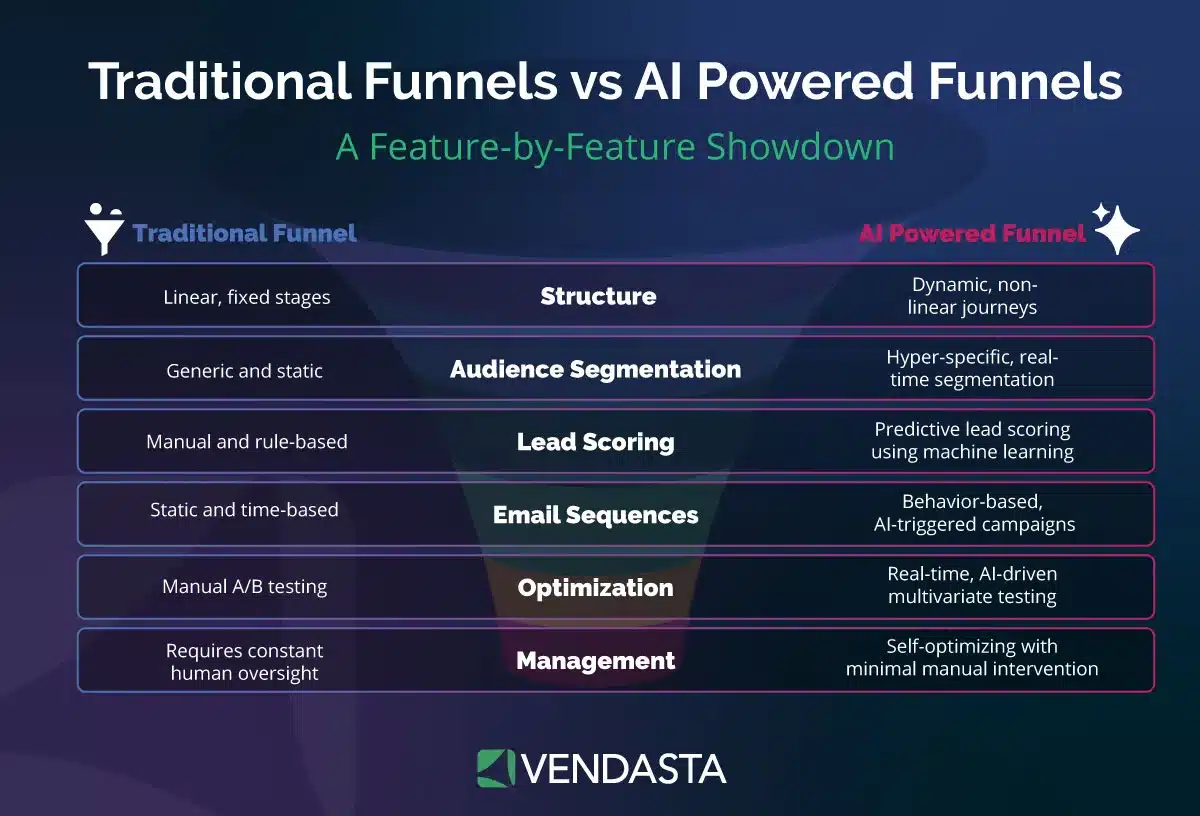
Why the Shift Matters?
Today’s customers demand personalized, timely, and relevant interactions. According to McKinsey, 71% of consumers expect personalized interactions, and 76% get frustrated when they don’t receive them (source). AI-powered funnels meet this demand by using intent signals, data modeling, and smart automation to serve the right message to the right person at the right time.
In contrast, traditional funnels—often limited to pre-built sequences or calendar-based campaigns—struggle to react quickly or accurately to customer needs. As buying behaviors become increasingly digital, unpredictable, and multi-channel, AI-powered funnels give businesses the agility and insight to stay competitive.
Benefits of an AI-powered sales funnel
Artificial intelligence helps with digital marketing and sales by optimizing customer journeys via personalization and other dynamic—and automated—choices, identifying potential leads based on consumer behaviors online, and creating efficiencies that help businesses get more bang for their marketing spend.
Some current benefits of using AI to power your sales funnel include:
- Increased efficiency and productivity. Lead generation is a critical task but also one full of tedious repeat work. From gathering and storing potential contacts to following up with leads, sales, and marketing staff spend a lot of time on routine tasks. AI tools can handle many of these tasks—or make these and other work easier—to drive efficiencies in your funnel.
- Enhanced customer experience through personalization. Knowing what your customer needs before they request it can help you stand out, and AI offers a way to sift through enormous amounts of data and make accurate predictions about those needs. Personalizing the customer experience with AI-driven segmenting and targeting increases your chance of closing deals or inspiring repeat and loyal clients.
- Improved sales forecasting. AI can gather, assess, and make predictions based on vast banks of data, and that can help you develop better sales forecasting. An in-depth understanding of your customers’ behaviors, the market in general, and other aspects of your sales funnel can also help you make data-driven decisions in areas such as staffing, procurement, or business growth.
- Better customer engagement. AI tools such as chatbots and virtual assistants can support strong engagement for existing clients and enhance customer service offerings. This can lead to increased client satisfaction and better overall customer lifetime values.
AI Across the Funnel: Awareness, Consideration, Conversion
While many view AI as just a tool for automation, its true power lies in optimizing each stage of the sales funnel—enhancing performance, personalization, and predictive insights at every turn. Below is a comprehensive breakdown of how artificial intelligence supercharges the traditional funnel stages: Awareness, Consideration, and Conversion.
Top of Funnel (Awareness)
The top of the funnel (TOFU) focuses on attracting potential customers and building brand awareness. AI helps marketers not only reach the right audience but also deliver relevant messaging at scale.
1. Lookalike Audience Modeling
AI platforms analyze your existing customer data (demographics, behaviors, purchase patterns) and create “lookalike” profiles. These insights power audience expansion tools on platforms like Meta, LinkedIn, and Google, helping you reach users who are statistically similar to your best customers—without manual guesswork.
Facebook’s lookalike audiences powered by AI can reduce cost per acquisition (CPA) by up to 25% compared to standard interest-based targeting.
2. Interest and Behavior-Based Segmentation
AI scans large volumes of online activity to segment users based on intent signals—such as product searches, site visits, or interaction with ads. This allows you to deliver hyper-relevant messaging even before a user explicitly expresses interest.
3. AI-Generated Ad Creatives and Landing Pages
Using tools like Jasper or Copy.ai, marketers can generate high-converting ad copy and landing page variations in minutes. Natural language models optimize tone, format, and content based on past campaign success data.
4. Real-Time A/B Testing and Optimization
AI-driven platforms run continuous experiments on creative elements (headlines, CTAs, images) and automatically push winning variants in real-time—maximizing ad spend without human intervention. Tools like Google Ads’ responsive search ads use this to optimize message delivery for each user query.
Middle of Funnel (Consideration)
In the MOFU stage, the goal is to educate, nurture, and qualify leads. AI plays a pivotal role in delivering personalized experiences and accelerating lead progression.
1. Smart Email Sequencing
AI-powered email platforms like GetResponse or Mailmodo track user behavior (opens, clicks, dwell time) to trigger personalized follow-up messages. These adaptive sequences increase engagement and reduce manual segmentation.
Example: An AI system might notice that a lead clicked on a webinar link but didn’t register—triggering a follow-up email 12 hours later with a personalized reminder and calendar integration.
2. Dynamic Website Personalization
Tools like Mutiny and Optimizely use AI to personalize your site in real-time based on traffic source, geolocation, industry, or buyer stage. A returning visitor might see different homepage banners or pricing tables than a first-timer, all tailored to their past behavior.
3. Conversational AI and Chatbots
AI chatbots like Drift, Intercom, or Tidio engage website visitors instantly, qualify leads by asking contextual questions, and route them to the right sales rep. This improves lead response times and ensures that only the most relevant inquiries reach your team.
4. Content Recommendations Based on Intent
AI engines suggest relevant blog posts, guides, videos, or demos based on the user’s prior interactions. Similar to Netflix-style recommendations, this boosts time on site and trust.
Example: A visitor who downloaded an eBook on “Local SEO Tips” might be shown a case study titled “How Agencies Scaled SEO Results with AI”.
Bottom of Funnel (Conversion)
The bottom of the funnel is where prospects are on the verge of purchasing. AI sharpens focus here by predicting intent, eliminating friction, and enabling smart follow-ups.
1. Predictive Lead Scoring
AI systems like Salesforce Einstein or Leadspace analyze firmographic, behavioral, and CRM data to assign a real-time score to each lead. Sales teams can then prioritize hot leads based on likelihood to convert, rather than arbitrary rules or gut feel.
2. Abandoned Cart Recovery
AI tools identify cart abandonment events and automatically trigger personalized messages—via email, SMS, or push notifications—tailored to product type, urgency, or incentive. Tools like Klaviyo use machine learning to time these nudges for maximum recovery.
3. Automated Offer and Pricing Adjustments
AI can recommend price adjustments based on real-time demand, inventory, user behavior, or competitive pricing. This is especially useful in ecommerce or SaaS free-to-paid conversions.
Example: AI might notice that a user has visited the pricing page four times in a week and auto-generates a 10% discount pop-up.
4. Voice AI and Conversation Summarization
Tools like Gong.io or Fireflies.ai record sales calls, transcribe them, and use NLP to summarize key objections, action items, and sentiment. These summaries are automatically pushed to your CRM for sales follow-up and training purposes.
Use cases for an AI-powered sales funnel
How you integrate AI sales and marketing tools into your sales funnel depends in part on your industry, the nature of your business, and what your sales goals are. The AI sales funnel use cases below illustrate how these tools can be leveraged for a variety of purposes:
E-commerce: Personalized Shopping & Cart Recovery at Scale
In ecommerce, milliseconds matter. AI-powered funnels give online retailers the ability to dynamically engage shoppers, personalize experiences, and recover revenue that would otherwise be lost.
Key Applications:
- AI Product Recommendations: Using collaborative filtering and deep learning, tools like Amazon Personalize or Bloomreach suggest products in real time based on a customer’s past purchases, search history, and behavior. This drives higher AOV (average order value) and cross-sell success.
- Cart Abandonment Recovery: AI detects when users leave items behind and automatically triggers behavior-based reminders via email, SMS, or web push. These messages are optimized for timing, product relevance, and incentives.
- Dynamic Pricing: Machine learning algorithms adjust pricing based on user intent, competitor trends, or real-time demand to maximize conversions without manual pricing updates.
The global average cart abandonment rate is over 70%, but AI-powered recovery emails can recover 15–30% of abandoned sales
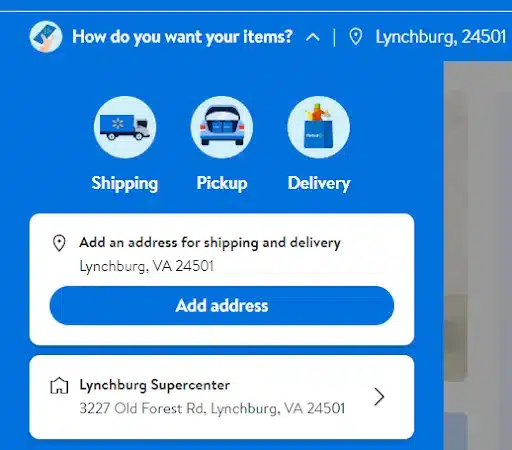
Image source: Walmart
SaaS: Smarter Onboarding and Lead Qualification
In the SaaS world, where long sales cycles and freemium models are common, AI-powered funnels help companies guide leads from interest to activation to retention—with minimal friction.
Key Applications:
- Automated Onboarding Flows: AI tools can deliver tailored onboarding sequences based on a user’s job role, company size, or in-app behavior. Systems like Appcues or Pendo adapt tutorials and tooltips dynamically.
- Predictive Lead Scoring: Instead of using fixed rules (e.g., visited pricing page), AI assigns dynamic conversion scores using behavioral data and CRM history. This helps sales reps focus on high-likelihood deals.
- AI Chat for Activation: Tools like Intercom’s Fin or Drift AI Assistant engage trial users with onboarding help, demo bookings, or contextual upsell messages.
- Usage-based Trigger Campaigns: AI-powered CRMs identify drop-off patterns and launch proactive re-engagement messages before churn risk escalates.
Agencies: Efficiency, Personalization, and Scale
Marketing agencies face two unique funnel challenges: serving a high volume of clients with limited resources and proving ROI consistently. AI-powered funnels solve both by automating manual work and delivering tailored insights.
Key Applications:
- Client Insights with AI Reports: Tools like Vendasta’s Snapshot Report use AI to analyze a prospect’s online presence, compare it with competitors, and generate ready-to-send audit reports. This shortens the prospecting cycle and adds instant value.
- Content Automation: AI tools like Copy.ai or ChatGPT generate custom email sequences, ads, blog intros, or campaign headlines—reducing agency production time significantly.
- White-label Chatbots and Inbox Management: AI assistants handle incoming lead inquiries on behalf of the agency’s SMB clients, boosting responsiveness and helping prove lead generation performance.
- Lead Routing and CRM Automation: Automatically assigns leads to the right sales rep or account manager based on region, vertical, or account size.
Healthcare, Legal, and Financial Services: Compliance and Always-On Engagement
Highly regulated industries require AI funnels that are both secure and service-oriented. Here, AI doesn’t just drive conversion—it ensures ethical, compliant, and efficient engagement.
Key Applications:
- 24/7 AI Chat Assistants: With natural language processing, bots handle appointment bookings, eligibility checks, or basic intake—even when the office is closed. This reduces drop-offs and improves user experience.
- Compliance-Safe AI Responses: AI tools trained on regulatory frameworks (HIPAA, GDPR, etc.) ensure responses stay within legal guidelines. For example, a healthcare AI assistant will never diagnose, but will direct users to book a consultation.
- Document Automation: AI assists in funnel stages that require forms, waivers, or contracts—auto-generating drafts based on user responses.
- Predictive Service Reminders: AI identifies when clients (e.g., patients or legal clients) are due for follow-up or renewal and sends automated reminders, reducing churn and improving service continuity.
5 AI Tools to Build Your Marketing Funnels
Whether you’re ready to white label AI sales tools or you want to invest in the benefits of AI-powered funnels for your agency, the first step is researching tools. Get started below by learning more about five AI tools that can help you build and support strong marketing and sales funnels.
1. Vendasta
Vendasta offers a number of marketing integrations and AI tools that help you drive efficiencies in your funnel. That includes social media marketing campaigns and multi-channel approaches you can manage from a single dashboard.
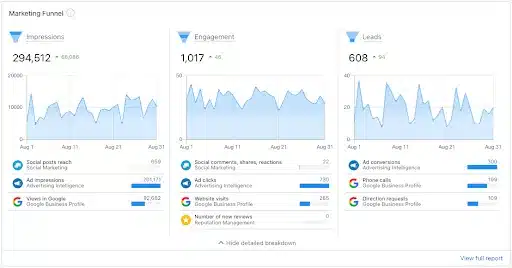
You can start by using AI to create in-depth reports of potential client businesses, getting insights into pain points. Use that knowledge to enhance the efficacy of your marketing materials or reach out with a personalized offer that increases your chance of a conversion.
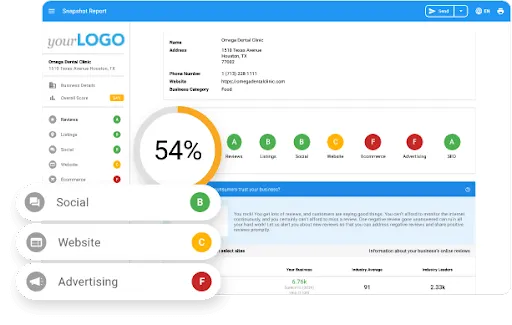
Vendasta’s automated tools also include features such as:
- Automated content generation and suggestions. Make fast work of social media posts and replies and generate on-page content that’s more likely to engage your audience.
- Deep dives into scaled campaigns to support segmenting, personalization, and understanding potential clients. Automate metrics and analytics that help you understand campaign performance at various levels, even when you’re sending to thousands of potential clients.
- 24/7 marketing and sales technology. Leverage tools such as chatbots and automated marketing campaigns to ensure your message works for you outside of normal business hours.
2. ClickFunnels
ClickFunnels automates marketing processes designed to get your audience from outside channels to your website, typically by creating funnels based on social media and online ads. It also provides tools for building sites, automating shopping cart experiences, and managing existing customer lists. This includes automated reporting and real-time tracking of consumer behavior.
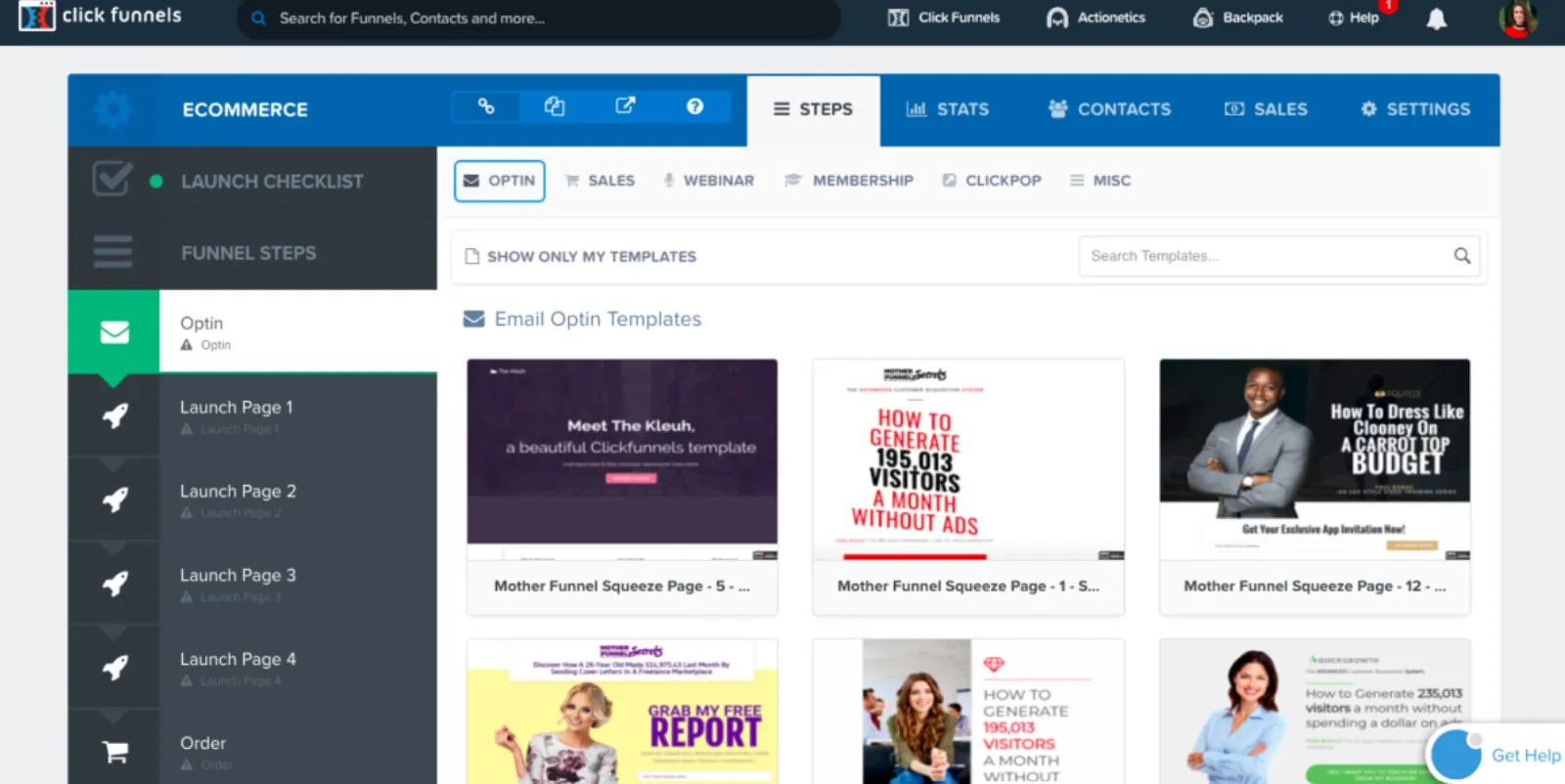
The idea of this AI and marketing tool is that it can replace other disparate tools to streamline the online marketing funnel for websites.
3. GetResponse
GetResponse concentrates on services related to engaging with your audience online. It offers list-building tools for email marketing and building site and landing pages. You can also leverage AI email generator and autoresponder tools to put some of your marketing tasks on autopilot with GetResponse.
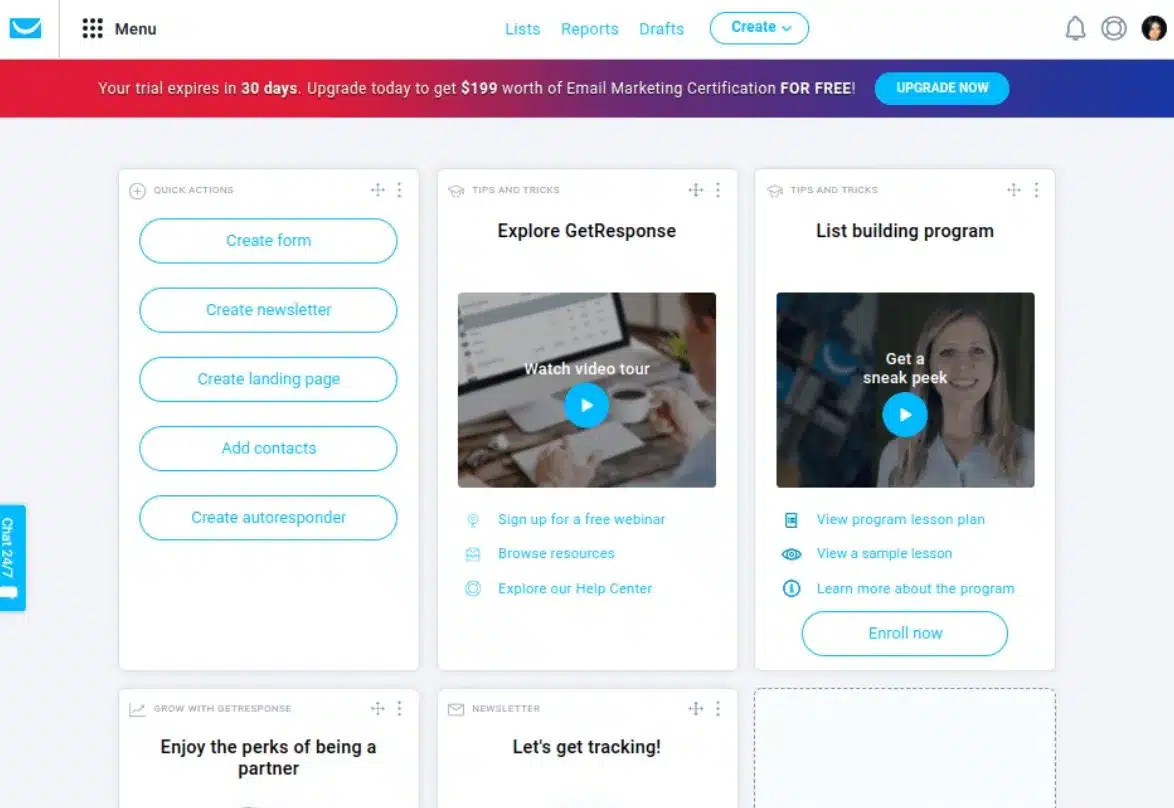
For on-site sales, GetReponse offers marketing integrations that support automated product recommendations and conversion funnel tools such as notifications. You can also use this tool to automate some webinar and paid ad tasks in your funnel.
4. Postaga
Postaga is a more specific AI marketing funnel tool that helps you create new campaign ideas or find specific contacts.
You can use Postaga to generate high-value backlink opportunities based on your marketing campaigns. It also analyzes existing content, including webpage content, and presents information about potential emails, contact names, or personal needs to help you create winning sales emails or presentations.
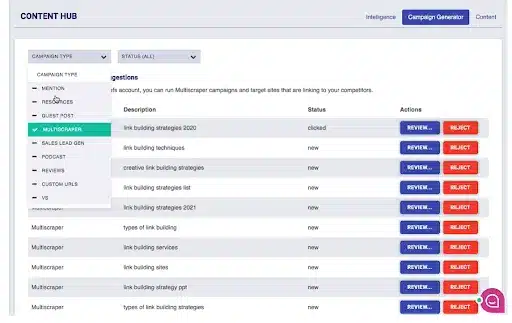
Image source: Postaga
5. My AI Front Desk
My AI Front Desk is a great addition to many AI sales funnels because it supports consumer contact without the need to constantly man a human-powered reception desk. My AI Front Desk can provide basic information and scheduling to clients via phone or chat, and it’s capable of handling some complex questions.
Machine learning allows this technology to learn about your business, making it more adept at answering questions. It can also send pertinent links via text to callers to prompt scheduling or other tasks.
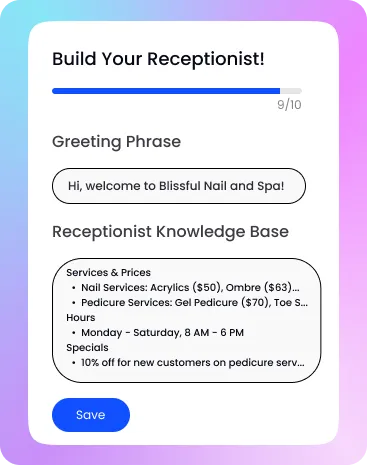
Image source: My AI Front Desk
The Future of Sales Funnels with AI
Sales funnels are evolving from static, linear pathways to intelligent, adaptive ecosystems—driven entirely by AI agents, natural language processing, real-time analytics, and emotional intelligence. As businesses compete in increasingly noisy and fragmented markets, the future of sales funnels will be defined not just by automation—but by autonomy, personalization, and predictive foresight.
Let’s explore how artificial intelligence is reshaping the future of funnel execution and customer experience across every stage.
AI Agents Managing the Full Funnel Journey
Imagine a virtual assistant—not just handling one part of the funnel, like lead capture—but managing the entire lifecycle of a customer. This is becoming a reality with full-stack AI agents.
These intelligent systems:
- Greet new leads via website chat or voice
- Qualify leads using contextual questions
- Route them to tailored offers or schedule demos
- Send follow-up emails automatically based on behavior
- Alert human reps when real-time intervention is needed
- Push data to CRM for hand-off or future re-engagement
Example: Tools like Vendasta’s AI Receptionist, Drift’s AI Assistant, and HubSpot’s AI Chatflows are early-stage examples of agents that reduce manual touchpoints across the funnel.
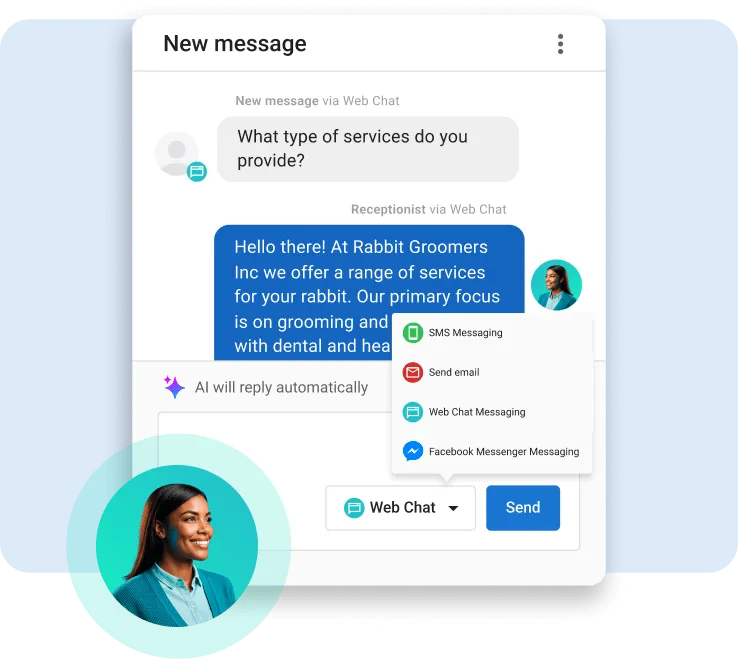
These AI agents will soon act not just as support tools—but as autonomous sales entities, learning from every conversation and optimizing their own performance.
Voice-Driven AI for Sales Calls
Voice AI is rapidly transforming the way businesses interact with prospects. Beyond chatbots, voice-first funnels are emerging, powered by AI that can listen, comprehend, and converse naturally—without scripts.
Key capabilities include:
- Natural conversation flows that understand context and switch topics like a human
- Real-time call transcription and intent extraction
- Scheduling and routing based on spoken preferences
- Trigger-based follow-ups via text or email post-call
According to a recent report, the global voice AI market is projected to reach $20.4 billion by 2030, largely driven by its role in virtual sales and service assistants.
Emotion Recognition and Sentiment-Based Decision Engines
The next frontier in funnel optimization is emotional intelligence at scale.
AI is now capable of detecting:
- Tone of voice
- Facial expressions (in video)
- Word choice and pacing
- Typing cadence or hesitations
From these inputs, AI can classify emotion (confusion, excitement, frustration) and adjust responses in real time—escalating to humans, changing scripts, or pausing upsells when tension is detected.
This will make AI-powered funnels feel more human, responsive, and ethically tuned, building trust through emotionally intelligent automation.
Predictive Funnel Shifts in Real-Time
The final piece of the future funnel is true adaptability—where AI continuously monitors funnel health and reshapes user paths before drop-off occurs.
Rather than fixed journeys (Step A → B → C), future funnels will:
- Detect when a user shows hesitation or disengagement
- Automatically shift messaging, channels, or offers
- Re-prioritize the lead within the sales pipeline
- Alert human reps with recommended next steps based on similar successful conversions
Example: A user lingering on the pricing page but not converting might instantly see a chatbot offering a discount code, followed by a personalized follow-up email within 10 minutes.
AI will act like a funnel autopilot, adjusting the experience dynamically—not based on guesswork, but on proven outcomes from thousands of similar users.
What This Means for Marketers and Sales Teams
The future of sales funnels with AI isn’t about replacing humans—it’s about enhancing performance, precision, and personalization.
You’ll spend less time setting up campaigns and more time analyzing insights. Less time reacting to lost leads, and more time watching your funnel optimize itself.
Those who adopt these technologies early will gain a data advantage, operational speed, and customer intimacy that manual funnels simply can’t match.
Leverage AI tools to power your sales funnels
AI-powered funnels are no longer a futuristic concept—they’re the new standard for scaling marketing and sales success. While human strategy and oversight remain essential, the integration of artificial intelligence offers unmatched advantages: instant personalization, predictive insights, and automation that runs 24/7.
From capturing leads with smart chatbots to nurturing them through dynamic email sequences and converting them with real-time personalization, AI transforms every stage of the funnel into a finely tuned conversion engine.
If you’re not leveraging tools like AI-generated content, automated lead nurturing, or AI-driven analytics, your competitors probably are—and they’re converting faster because of it.
Ready to see what an AI-powered funnel can do for your business?
Let us show you. Schedule a free demo with our team and discover how Vendasta’s white-label AI solutions can help you capture more leads, convert faster, and grow smarter.
The future of funnels is intelligent. Don’t get left behind—automate smarter, personalize deeper, and convert better with AI.
AI-Powered Funnels FAQs
1. Can I use AI to create a sales funnel?
Yes. AI can help you build and automate sales funnels by handling lead scoring, content delivery, email follow-ups, and segmentation. Vendasta’s AI-powered tools make it easy for agencies to launch intelligent funnels that convert more efficiently.
2. What is AI-powered advertising?
AI-powered advertising uses machine learning to manage targeting, bidding, and creative optimization. It analyzes user data in real time to deliver more relevant and effective ads without manual adjustments.
3. What is an AI-powered platform?
An AI-powered platform combines automation, personalization, and predictive analytics to improve sales and marketing performance. Vendasta’s platform is one example, offering agencies white-label tools to automate client acquisition and engagement.
4. Can AI generate ads?
Yes. AI tools can write ad copy, test variations, select visuals, and even predict which ads will perform best. Platforms like Jasper and Meta’s ad tools use large data sets to optimize creative output.
5. Can AI replace salespeople?
No, but it can assist them. AI handles repetitive tasks like qualifying leads, scheduling demos, or sending reminders. Human salespeople are still needed for relationship-building, negotiation, and closing complex deals.
6. How to create sales funnels?
Define your customer journey stages, then use landing pages, email tools, CRMs, and analytics to guide leads through. AI improves funnel performance by personalizing messages, predicting behavior, and automating key touchpoints. Platforms like Vendasta can help you implement this from start to finish.
This article was originally published in March 2024 and was updated in June 2025 to include the latest information and insights.


